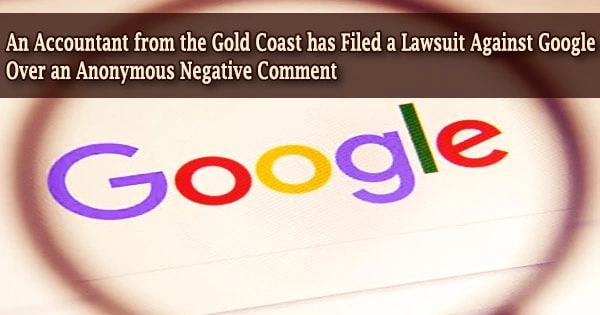A Gold Coast accountant has filed a lawsuit against Google, pitting his little firm against the anonymity of the internet.
Kyran Seeto is attempting to have a brief anonymous review of his firm, Max Accountants, and two wordless one-star evaluations from online users he believes are not clients of his firm removed from the US-based corporation.
“I’m trying to build a business, but with literally a keystroke they can destroy you,” he said. “It’s not fair.”
Justice David O’Callaghan agreed at a Federal Court hearing that the court could and should consider the case.
“The court has jurisdiction in the proceeding,” he said last week, adding: “The applicant has a prima facie case.”
Courts ruling against Google
The lawsuit is the latest attempt to lift the shroud of anonymity surrounding online remarks and make Google accountable. Newspapers and other forms of media have long been held responsible for the content they publish, but online platforms like Facebook and Google contend that they are not publishers.
So far, Australian courts have refuted such a claim.
After searches for her name were linked to erroneous and defamatory content, Google lost a nine-year court battle with a South Australian researcher.
Gordon Cheng, an Adelaide lawyer, won a $750,000 defamation award in February against a lady who had never been a client but had left a negative comment on Google.
We advertise on Google. When clients come in we ask them where they’ve come from … more than half have come from Google.
Mr. Seeto
Google was then forced to pay $40,000 in damages for defaming Melbourne lawyer George Defteros in April.
Mr. Defteros was successful in his lawsuit against Google for bringing up his name in reference to gangland leaders in Victoria. Despite Google’s protests, Justice Melinda Richards determined that the business constituted a publisher.
“The Google search engine … is not a passive tool,” she wrote in her 98-page judgment.
Google Australia agents didn’t show up at the meeting for Gold Coast bookkeeper Mr. Seeto. The organization was reached by the ABC yet declined to react on the grounds that the matter is under the watchful eye of the courts.
Bad reviews have ‘a significant impact’
Mr. Seeto’s case rotates around only 82 words from web client “Emma Anderson,” posted five months prior on a Google audit that seems when individuals utilize the search engine to look for Max Accountants.
“Don’t bother going to this one,” the review says. “Unless you want your concerns and enquires to be met with hostility.”
“My favorite is when the account (sic) said to me, ‘That’s a joke, I don’t believe that that’s a joke.’ They need training in customer service.”
“Max accountants can take up to 20 days to even lodge your tax, they don’t tell you that.”
“Wouldn’t bother, my first time using them and I know I’ll be going back to my old accountant.”
Mr. Seeto stated “Emma Anderson,” “Sharmane Harris,” and “Brett Williams,” who left identical one-star evaluations around the same time, were not clients.
Those internet users haven’t left evaluations for any other businesses and haven’t included any personal or identifying information.
“I’ve gone through it,” Mr. Seeto said.
“These names I’ve searched on our database. I’ve asked staff: Did it happen?”
“I’m in the office every day, I sit next to my receptionist and my staff why would we say something like that as claimed in the review?”
Small firms, according to the accountant, are effectively impotent in the face of the internet behemoth, which generated $4.8 billion in revenue in Australia last financial year.
“It has a significant impact,” Mr. Seeto said.
“We advertise on Google. When clients come in we ask them where they’ve come from … more than half have come from Google.”
“As a consequence of putting these low-star ratings on, they turn away or they’re not sure.”
Mark Stanarevic of Matrix Legal, the accountant’s lawyer, said his firm frequently heard from clients with similar complaints: small companies annoyed by poor, anonymous evaluations that many suspected were created by hostile competitors.
“It’s a big problem because it’s so easy to do and it’s online,” he said. “And for a small business, it’s so damaging.”
Dentist forces Google to open wide
Melbourne dentist Matthew Kabbabe, who claims he was defamed in an anonymous online review, persuaded a Federal Court judge to order Google to reveal the identity of an internet user known only as “CBsm 23” earlier this year. He intends to sue them for defamation once he learns their identity.
The single unfavorable review, according to Dr. Kabbabe, had a significant impact on his teeth-whitening business and his life.
“I believe it is extremely unfair that people are allowed to anonymously attack honest, hardworking small businesses,” Dr. Kabbabe told the ABC at the time.
On Dr. Kabbabe’s business page, the review in question is the only one with negative feedback. His company has received five stars from other reviewers.
Janice Duffy, a former SA health department researcher, successfully sued Google for slander in 2015, winning $100,000 in damages plus interest.
But it was not easy.
Dr. Duffy claimed that articles from the Ripoff Report website defamed her and that Google had refused her request to remove the material from its search engine. Dr. Duffy discovered that Google searches for her name resulted in the display of extracts from and hyperlinks to the material on the Ripoff Report in 2009.
She filed a civil complaint against Google in the South Australian Supreme Court two years later. Google filed an appeal after she won in 2015. The appeal was denied by the Supreme Court’s entire bench in 2017.
No way out
Consumers are increasingly using search engines to find information about small businesses, thanks to the rapid fall of telephone books and suburban newspapers, as well as the explosive development of smartphone use and internet connectivity.
And Google dominates.
“Ninety-five per cent of the search market is Google. If you want to be found, it has to be Google,” said Taylor Merwin of StudioHawk.
StudioHawk is a search engine optimization (SEO) firm that tries to leverage Google’s algorithm to get its clients to the top of the page when people search online.
“Google is so important for small businesses,” Ms. Merwin said.
“And reviews are too. Any kind of review is super important when it comes to customers wanting to buy your product or spend money on your services. So even when you do have a small number of reviews, people are going to go through those and see what people are saying about your business.” Mr. Seeto’s case continues.
















